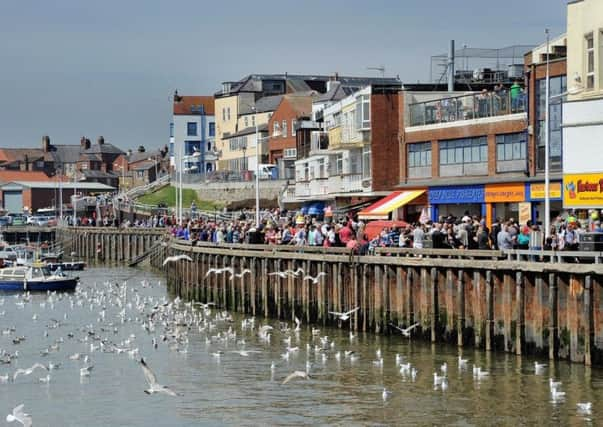Andrew Vine: Whiff of decline and a breath of fresh air '“ the challenge facing Yorkshire's resorts


This was the aroma that characterised much of what then passed as holiday accommodation when I was a tyro reporter and unwitting witness to an east coast tourist trade that was dying.
That past came alive again, as vivid as yesterday as I sniffed the air. Lousy food, lumpy beds with cheap nylon sheets, shared bathrooms and owners who kicked their guests out after breakfast with instructions not to return until the 5pm gammon tea topped with a roundel of tinned pineapple and boiled cabbage.
Advertisement
Hide AdAdvertisement
Hide AdThe odd survivor of that grim lost age still clings on if the stench was anything to go by, and fleetingly I was tempted to knock at the door and ask if I could come in, just for a minute or two, to catch a glimpse of that bygone era.
Back then, the conversations of guest house owners in Bridlington and Scarborough revolved around moaning about how trade was dropping off year by year.
No wonder, but what they never acknowledged was that they were the architects of their own downfall. There were good guest houses and hotels, of course, but in an age of growing aspiration and affluence, too many hadn’t moved on since the 1950s.
The people of West and South Yorkshire who were the backbone of the coast’s tourist trade were discovering in increasing numbers that for about the same price as a week in one of these dumps they could jet off to Spain on a package holiday.
Advertisement
Hide AdAdvertisement
Hide AdThe sun shone, the drinks were cheap, and you didn’t have to queue on the landing for the communal bathroom, clutching a towel and hoping that the person in front didn’t leave it filthy.
Instead of boiled cabbage and rubbery gammon fit only for throwing like a Frisbee for a dog to chase, there was paella and tapas.
But there was a resistance to change that was jaw-dropping. One chairman of a guest house association told me with supreme confidence that the package holiday boom was a fad and would fizzle out.
It was his livelihood that fizzled out instead, one of many, as the coast learned the hard way that it must reinvent itself if it was going to be anything other than a day-trip destination.
Advertisement
Hide AdAdvertisement
Hide AdWell, it has, and three cheers for that. Wandering the streets of seaside towns I’ve loved since boyhood, and known well all my adult life, gladdens my heart now. Having watched with sadness as they declined it’s a kick to see them start prospering once more. Apart from the occasional living museum like the one I passed in Bridlington, the coast is presenting a much smarter face to the world.
Gone is the stern, penny-pinching aspect of so many guest houses and hotels, with their cheapest-available food and décor, having been transformed into boutique accommodation that is welcoming, chic and actually serving meals well worth paying for.
Gone too are the squalid holiday flats, to be replaced by comfortable self-catering accomodation.
And surprise, surprise, the visitors are coming back to stay in increasing numbers, because the accommodation meets their expectations.
Advertisement
Hide AdAdvertisement
Hide AdThe more enlightened owners I knew all those years ago in the early 1980s realised that the answer to foreign competition was to go upmarket in what they offered, and that has been the key to the coast’s renaissance.
It never seemed to penetrate the thick, parsimonious heads of the gammon-and-cabbage brigade that they needed to invest in their properties, because people weren’t going to pay to stay somewhere less comfortable than their homes.
They wanted a bathroom to themselves and their family, not shared with a stranger with BO from the room down the corridor.
The coast also needed a stroke of luck, and it has come in a strange reversal of the fate that befell it getting on for four decades ago. It’s now the package holiday that is not looking anything like as attractive as it once did.
Advertisement
Hide AdAdvertisement
Hide AdSoaring prices for the Mediterranean, and stealth charges that make so-called budget flights a lot more expensive than they initially appear, are turning the attention of many back to holidaying in Britain.
This is a golden opportunity for the Yorkshire coast, and one that needs to seized. Dare we hope for a return of the days when the “no vacancies” signs go up at Easter and stay in place until September? It’s possible.
But if that is to happen, the coast needs a helping hand. It’s done an immense amount to help itself, but there ought to be a recognition at Government level that it deserves a better deal, especially investment to improve the roads and railways that deliver the tourists.
Even when I first went to work there, the Government generally ignored coastal communities when it came to handing out funding, and the decades since have seen no change in that.
Advertisement
Hide AdAdvertisement
Hide AdThe bald facts cry out for money to be pumped in. Behind the bustle of a summer season in full swing can lie a story of deprivation and low wages.
The last few weeks have seen surveys identifying coastal communities as blackspots for both personal bankruptcies and drug abuse, both certain indicators of underlying economic problems.
Yet our seaside towns have every reason to be optimistic as what will hopefully be a bumper summer approaches, not least thanks to the reinvention of its offer to visitors.
There are still lessons to be learned from what is now that far-off age of decline of the 1980s – that the coast must never again let itself become stuck in the past, but be alive to the changing demands and tastes of its visitors. If it does that, the future’s bright.
Read Andrew Vine in The Yorkshire Post every Tuesday.